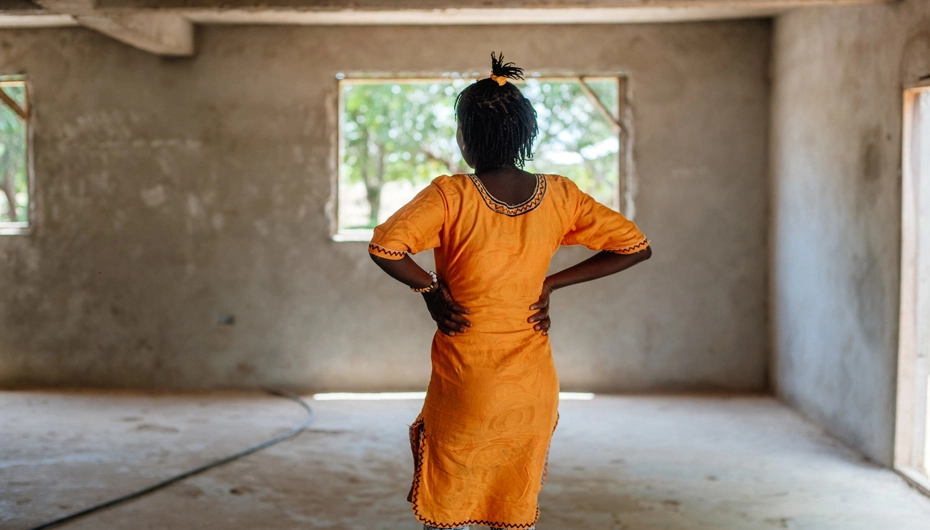Media Centre - Media release - 6 February 2021
COVID-19 leading to “worrying” rise in group female genital mutilation gatherings in Somalia, Plan International Australia warns

Girls in Somalia are being subjected to female genital mutilation (FGM) in group gatherings as rates of the harmful practice rise because of COVID-19.
At a recent event, up to 20 girls are reported to have been present, according to Plan International Australia.
The child rights and humanitarian organisation has condemned the trend as “worrying” evidence that FGM is increasing as the pandemic forces girls to spend more time at home, placing many at greater risk of gender-based violence.
Sadia Allin, Country Director for Plan International Somalia, said: “We have heard reports of group gatherings where up to 20 girls have been subjected to FGM in places like Abdaal and Dhalocad, in the Sahil region.
“This is extremely worrying and is further evidence that awareness of the dangers of this harmful practice has reduced as a result of the COVID-19 pandemic.”
On International Day of Zero Tolerance towards FGM, Plan International Australia is calling for programs that protect adolescent girls to be urgently prioritised and funding substantially scaled up’.
FGM affects around 200 million girls and women globally. It involves the partial or total removal of the external genitalia and in Somalia the vaginal opening is also often sewn up – a practice called infibulation.
A Plan International assessment carried out in Hargeysa and Burao in Somalia last year found that 42% of adults believe that being out of education increases a girls’ risk of undergoing FGM, which traditionally takes place during the school holidays.
At the same time, programmes to prevent and raise awareness of the dangers of the practice, which has no medical benefit, have had to stop or be scaled back due to lockdown restrictions.
In the same survey, 61% of respondents said they believe that FGM has increased because of the pandemic.
According to the United Nations Population Fund, COVID-19 could have far reaching impacts on the effort to end FGM, with a potential two million FGM cases occurring by 2030 that could have otherwise been averted.
Somalia has the highest rates of FGM in the world, with 98% of girls undergoing it between the ages of five and 11, Unicef research revealed.
The violent practice is still legal in the country and is deeply entrenched in Somali society. For parents, it is often seen as a necessary part of upholding family honour and a pre-condition for marriage.
Schools have now re-opened, but there are growing concerns among teachers and community workers that many girls have not returned to their classes due to increased rates of early marriage and FGM, and the economic pressures caused by COVID-19.
The assessment also found that of the 25% of children who were not attending school prior to the pandemic, nearly three-quarters (73%) were girls.
“I am extremely alarmed by these reports coming in from our Somalia office. Girls are usually powerless to refuse the procedure, and many don’t even know what it is before it is performed on them.” said Plan International Australia CEO Susanne Legena.
“We know that for girls around the world, education is the key to transformation, unlocking opportunities and allowing them to choose their own futures. But in Somalia, school is also an alternative to marriage and therefore acts as a protection against harmful practices such as FGM. When girls or women are isolated at home, they’re at far more risk of gender-based violence, with less access to social services, care and legal services,” she added.
Plan International is also calling on policymakers in Somalia to outlaw FGM and strengthen sexual and reproductive health rights, while tackling the deep-rooted inequalities and social norms which allow the practice to exist.
“Without renewed efforts, there is a real risk that the progress we have made in raising awareness of the dangers of FGM and encouraging communities to stop the practice will be lost,” Ms Allin said.
Although primarily concentrated in Africa and the Middle East, FGM is a universal problem and is also practiced in some countries in Asia and Latin America. The practice continues to persist amongst immigrant populations living in Western Europe, North America, Australia and New Zealand.
Anti-FGM campaigner and Plan International Australia supporter Khadija Gbla – who was “cut” as a young girl in Gambia not long before her family immigrated to Adelaide and who now works with FGM survivors across Australia – said school closures around the globe had “created a perfect platform for FGM to thrive.”
“In Australia, it has been schools, teachers, childcare workers, and counsellors who have been at the forefront helping to protect these little girls. Because of COVID-19 they haven’t had as much access to them and that’s really dangerous,” she said.
Throughout the COVID-19 pandemic, Plan International and partners have been continuing to raise vital awareness of the need to protect girls from FGM.
“We are working on the ground in countries such as Somalia to engage and empower families, communities and traditional and religious leaders to change attitudes and norms around this harmful practice. FGM violates a girl’s most basic human right to protection and control over her own body,” said Ms Legena.
In Somalia, this has included broadcasting radio messages about the devastating consequences the practice can have on girls’ health, making it clear that it is not required by religion and calling on communities to stop the practice.
Key facts on FGM:
- Female genital mutilation, also known as female circumcision, excision or genital cutting, comprises all procedures that involve partial or total removal of the external female genitalia, or other injuries to the genital organs for non-medical reasons, mostly carried out between infancy and age 15.
- According to the WHO, more than three million girls are estimated to be at risk for FGM annually. More than 200 million girls and women alive today have been cut in 30 countries in Africa, the Middle East and Asia where FGM is concentrated.
- The procedure has no health benefits for girls and women. Because it is usually performed without permission and often against will, it violates girls’ right to make important decisions about their sexual and reproductive health.
- Short-term health risks of FGM include severe pain, excessive bleeding, infections and psychological consequences. Long-term health risks include pain, infections, menstrual problems, and pregnancy and childbirth problems such as difficult or prolonged labour, post-partum hemorrhage, fistula, as well as death of both mother and baby.
- Although there is an overall decline in the prevalence of FGM, the number of girls undergoing the practice is increasing due to population growth. If current trends continue, 68 million adolescent girls between ages 15 and 19 will be subjected to FGM between 2015 and 2030.
About Plan International Australia
Put simply, we’re the charity for girls’ equality. We tackle the root causes of poverty, support communities through crisis, campaign for gender equality, and help governments do what’s right for children and particularly for girls. We believe a better world is possible. An equal world; a world where all children can live happy and healthy lives, and where girls can take their rightful place as equals.
With more than 80 years of experience, Plan International is expertly placed to respond to the COVID-19 crisis and its secondary impacts. We are working to support and protect the most vulnerable children around the world, including girls who are at risk of increased rights violations, and to end the practice of FGM. You can help us, too.
Media contacts


